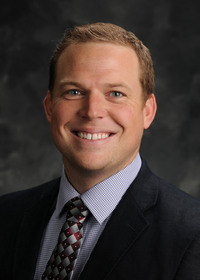Information Possibly Outdated
The information presented on this page was originally released on June 14, 1999. It may not be outdated, but please search our site for more current information. If you plan to quote or reference this information in a publication, please check with the Extension specialist or author before proceeding.
MSU Ag Economists Advise Policymakers On Crop Risk
MISSISSIPPI STATE -- Crop insurance programs are too complex for a quick fix, and two Mississippi State University agricultural economists want to make sure policymakers understand that even minor changes can have major ramifications on growers and government costs.
Drs. Keith Coble and Barry Barnett, both faculty members in MSU's Department of Agricultural Economics, have met with local farm organizations and surveyed individual farmers on their concerns regarding crop insurance and risk management decisions. With extensive experience in risk management issues, they bring a unique understanding of the impact various decisions will have on farmers, the insurance industry and the government.
"Policy changes need to be based on a thorough understanding of the dynamics of insurance programs," Coble said. "We try to educate decisionmakers on the difference in the price support payments before 1996, the current transition payments and options for a future farm policy."
Coble has testified before the Senate Agriculture Committee and various advisory committees, such as the Commission for 21st Century Agriculture Policy.
"A short-term response this year would be a new policy related to crop insurance," Coble said. "On the other hand, debate will continue over the long-term solutions as they revamp farm policy by 2002."
The two economists have hosted key Senate staff members for extensive crop insurance discussions in their MSU offices, fielded numerous calls from Congressional staff members and made presentations on crop insurance and risk management strategies around the country.
"Given the current low market prices, there is much debate on what can be done to help farmers. As the market goes down, the government will be looking for another way to support growers," Barnett said. "Originally, crop insurance addressed yield problems, now people are asking if it also can provide price support."
In 1996, farm policy entered a new era of governmental support for the nation's farmers. The old price support programs were replaced by transition payments until growers could find other methods to manage their risks.
"Transition payments were adequate as long as market prices were reasonable," Barnett said. "Today's market prices have Congress looking for ways they can help farmers without adjusting the transition payments. Crop insurance has been the primary focus."
Coble said policymakers walk a fine line trying to develop an effective safety net without creating incentives for failure.
"Crop insurance has performed much better in some regions than it has in the Mid-South," Coble said. "We need to understand why that has occurred and make the program more viable in this region."
Dr. John Lee, head of MSU's ag economics department, said Coble and Barnett are among the nation's top agriculture risk management experts.
"With the agricultural sector in an economic downturn, legislators and major farm organizations are scrambling for workable ideas to provide a safety net for struggling farmers," Lee said. "Much interest has focused on various proposals to modify traditional crop insurance to provide protection from yield and revenue risks. No one understands the attractions and pitfalls of these proposals better than Keith Coble and Barry Barnett."
Lee said the pair have garnered $412,000 in federal grants to conduct research on crop insurance and other risk management tools for farmers. Barnett is completing a grant-funded study of factors reducing the effectiveness of crop insurance for Southern producers. With the funding from a large federal grant, Coble has begun a national survey of farmers' risk management practices.
Contact: Dr. John Lee, (662) 325-2750




